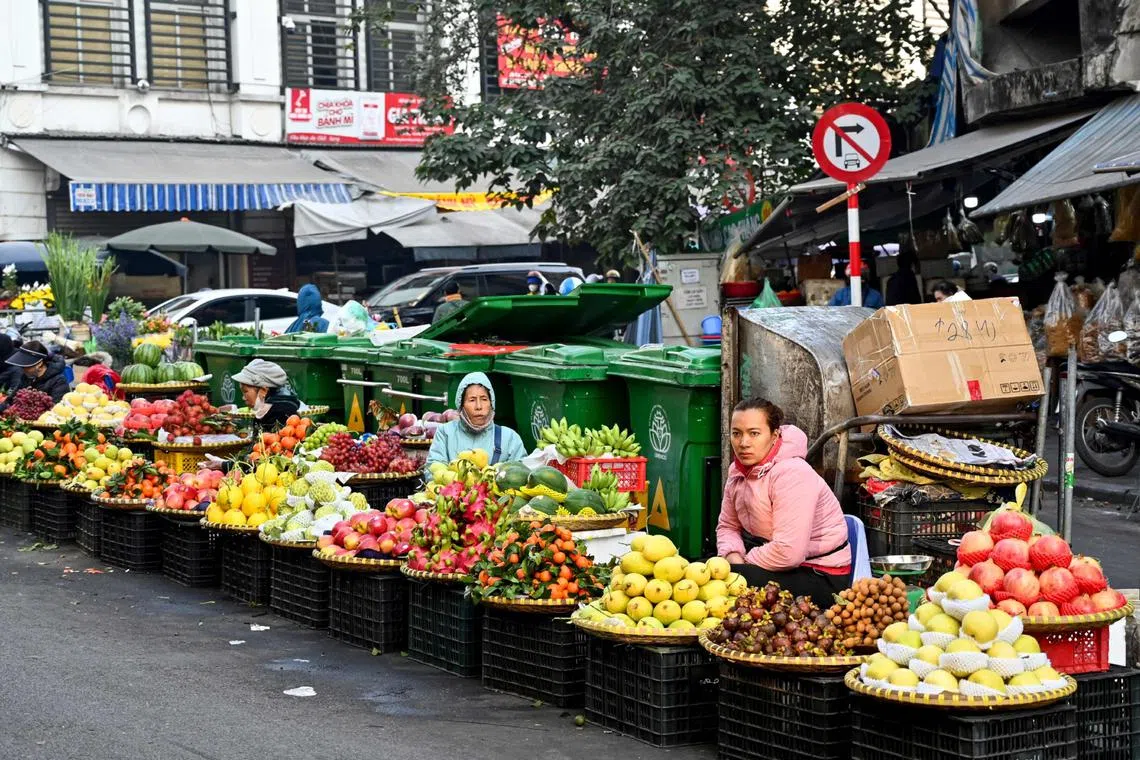Vietnam slashes duties on range of imports to head off US tariffs
Sign up now: Get insights on Asia's fast-moving developments

Vietnam benefited from the trade war between the US and China during President Donald Trump's first term.
PHOTO: AFP
Follow topic:
HANOI – Vietnam said it has cut import duties on a range of goods, including cars, liquefied gas and some agricultural products, with concerns escalating ahead of US President Donald Trump’s planned unveiling of sweeping tariffs on “all countries”.
The announcement came after Prime Minister Pham Minh Chinh said in March that Hanoi was reviewing levies
Washington’s trade deficit with Vietnam is the third-highest of any country, after China and Mexico, and there are increasing fears it could be a key target of the White House’s tariff drive, which has sent shockwaves through global markets.
“From March 31, 2025, certain items such as cars, wood, ethanol, frozen chicken legs, pistachios, almonds, fresh apples, cherries, raisins, etc, will be subject to a new preferential import duty rate,” a statement said late on March 31 on the government’s official news portal.
It added that import duties on some cars will be halved, and the tax rate for liquefied natural gas will drop from 5 to 2 per cent.
Tariffs on frozen chicken legs will be reduced from 20 to 15 per cent, the rates on unshelled pistachios will be slashed from 15 to 5 per cent, and for almonds it will drop from 10 to 5 per cent.
“I believe that Vietnam is doing everything they can to soften the blow,” said Mr Bruno Jaspaert, chief executive at Deep C Industrial Zones in Vietnam and chairman of the country’s European chamber of commerce.
“Rather than retaliate, they give and hope to be treated in a better way than most. But the overall expectation is that there will still be tariffs,” he said.
Trade war beneficiary
The Finance Ministry said last week that the changes in duties were to “cope with the complicated and unpredictable developments of the world’s geopolitical and economic situation, especially the changes in economic, trade and tariff policies”.
Mr Trump said on March 30 that tariffs would apply to “all countries”
Vietnam also said last week it would allow Mr Elon Musk’s SpaceX to launch its Starlink satellite internet service as part of a pilot programme that will last until the end of 2030.
There is no limit on foreign ownership of the service, the government said.
Mr Chinh also told US Ambassador Marc Knapper in March that Vietnam was “actively addressing the current concerns of the US in economic-trade-investment relations”, including sending its top trade official to the US.
The US deficit with Vietnam hit US$123.5 billion (S$165.8 billion) in 2024, up more than 18 per cent from 2023, according to the Office of the United States Trade Representative.
Vietnam is a manufacturing powerhouse that is heavily reliant on exports and the US was its biggest market in 2024.
Many American companies have built factories there and Chinese firms are also using the country to access the US market.
Vietnam benefited from the trade war between Beijing and Washington during Mr Trump’s first term as it became an alternative manufacturing site in Asia amid intensified US pressure on China. AFP

